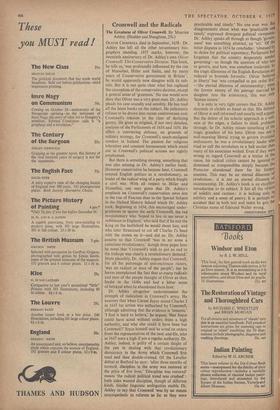Cromwell and the Radicals
The Greatness of Oliver Cromwell. By Maurice Ashley. (Hodder and Stoughton, 25s.)
OLIVER CROMWELL died in September, 1658: Dr. Ashley has left all the other tercentenary bio- graphers standing. 1957 marks, however, the twentieth anniversary of Dr. Ashley's own Oliver Cronzwell: The Conservative Dictator. This book, he tells us, 'was profoundly influenced by the rise of Mussolini, Hitler and Stalin, and by many years of Conservative government in Britain' : he would apparently now disagree with its sub- title. But it is not quite clear what has replaced the conception of the conservative dictator, except a general sense of 'greatness.' No one would now deny that Oliver was a very great man. Dr. Ashley pleads his case soundly and sensibly. He has read all the latest books on the subject. He judiciously refuses to be drawn into recent controversies over Cromwell's relation to the class of declining gentry. He gives us original, if not very detailed, analyses of the Parliaments of 1654 and 1656. He offers a convincing defence, on grounds of military strategy, for Cromwell's much-maligned conduct in Ireland. The passion for religious toleration and constant humaneness which stand out in Cromwell's political actions are rightly emphasised.
But there is something missing, something that was also missing in Dr. Ashley's earlier book. However conservative he became later, Cromwell entered English politics as a revolutionary, as leader of the radical wing of a party which fought a civil war. With all respect to Hitler and Mussolini, one may guess that Dr. Ashley's emphasis on Cromwell's conservatism owes less to the rise of Fascism than to the Special Subject in the Oxford History School which Dr. Ashley took. Beginning in 1654, this encouraged under- graduates to ignore the early Cromwell, the red revolutionary who `hoped to live to see never a nobleman in England,' who said that if he met the King on the battlefield he would shoot him, and who later threatened to cut off Charles l's head with the crown on it—and did so. Dr. Ashley assures us that Cromwell 'was in no sense a conscious revolutionary,' though three pages later he notes' that 'Cromwell's wish to put an end to the bishops was clearly a revolutionary demand.' More plausibly, Dr. Ashley argues that Cromwell, for all his patronage of anti-enclosure rioters, 'was no radical or man of the people'; but he leaves unexplained the fact that so many radicals and men of the people thought of Oliver as their leader in the 1640s and had a bitter sense of betrayal when he abandoned them later.
Dr. Ashley altogether underestimates the strength of radicalism in Cromwell's army. He assumes that when Cornet Joyce seized Charles I in 1647 his action was authorised by Cromwell, although admitting that the evidence is `tenuous.' `I find it hard to believe,' he argues, 'that Joyce could have acted without orders from a high authority, and who else could it have been but Cromwell?' Joyce himself said he acted on orders from the representatives of the rank and file, who in 1647 were a high if not a regular authority. Dr. Ashley, indeed, is guilty of a certain sleight of the pen in dealing with that revolutionary democracy in the Army which Cromwell first used and then double-crossed. Of the Leveller. defeat at Burford he says : 'after three months of turmoil, discipline in the army was restored at the price of five lives.' Discipline was restored' means 'the radical political trend was crushed' : both sides wanted discipline, though of different kinds. Similar linguistic ambiguities enable Dr. Ashley to say that Cromwell 'was by no means unsympathetic to reforms so far as they were
practicable and timely.' No one ever was. But disagreements about what was 'practicable and timely' expressed divergent political viewpoint! Dr. Ashley speaks all through as though 'govern ment' was something abstract, an 'art.' Of th bitter disputes in 1654 he concludes : 'obsessed bY its desire for political supremacy, Parliament hod forgotten that the country desperately needed governing'—as though the question of who was to govern, and how, was somehow irrelevant. So the tragic dilemmas of the English Revolution are reduced to bromide formulm : Oliver 'believed in liberty' but `was compelled to put order first' =the eternal dilemma of statesmanship'; the former enemy of the peerage married his daughter into the aristocracy, this was only 'human nature.'
It is only in very tight corners that Dr. Ashley descends to clichés as banal as this. His defence of Oliver is well informed and usually well argued' But the defect of his eclectic approach is a soft. ness at the edges, a failure to think problas through. So Dr. Ashley misses something of the tragic grandeur of his hero. Oliver was not a well-meaning liberal trying to govern irrational enthusiasts; he was a revolutionary leader who tried to call the revolution to a halt earlier than many of his associates wished. Even if they were
e
wrong to regard Cromwell as a traitor to the cause, his radical critics cannot be ignored o dismissed as irresponsibles simply because the Protector abandoned them for his forrner enemies. This may be an eternal dilemma Of revolutions : it is not an eternal dilemma of statesmanship. Dr. Ashley's book is an excellent introduction to its subject. It has all the virtues of solidity and caution : it is lacking only 113 subtlety and a sense of poetry. It is perhaps no accident that in both text and index he gets tbe Christian name of Edmund Waller wrong.
CH RI STOPHER
woo






















































 Previous page
Previous page